九年级英语第一单元Unit 1 Section B学案(人教版)
- 格式:doc
- 大小:37.00 KB
- 文档页数:12
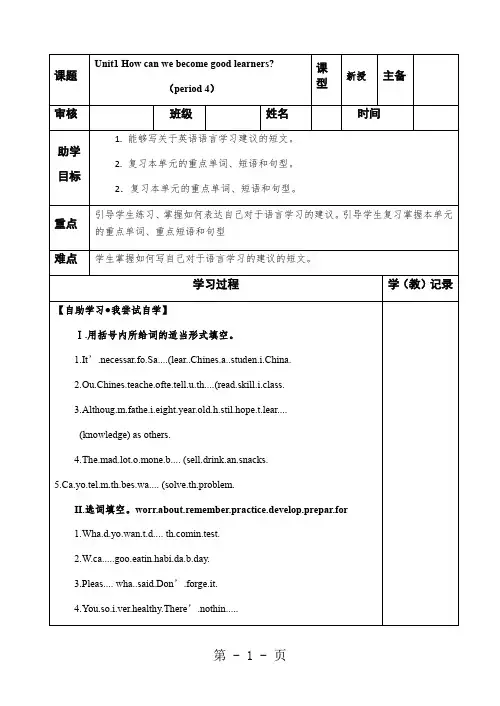
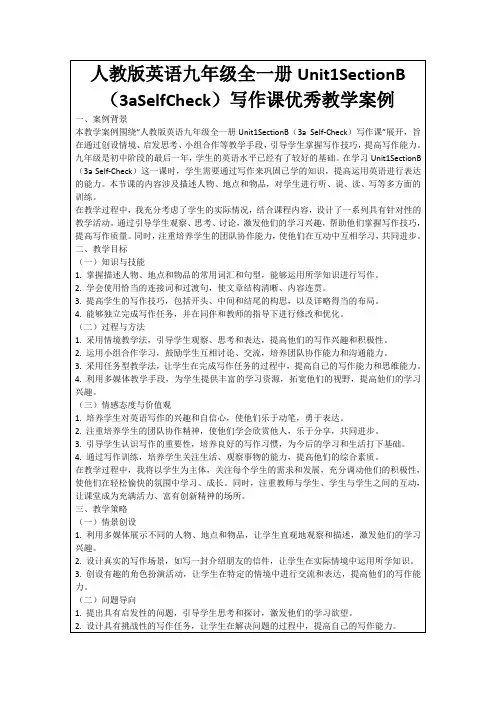
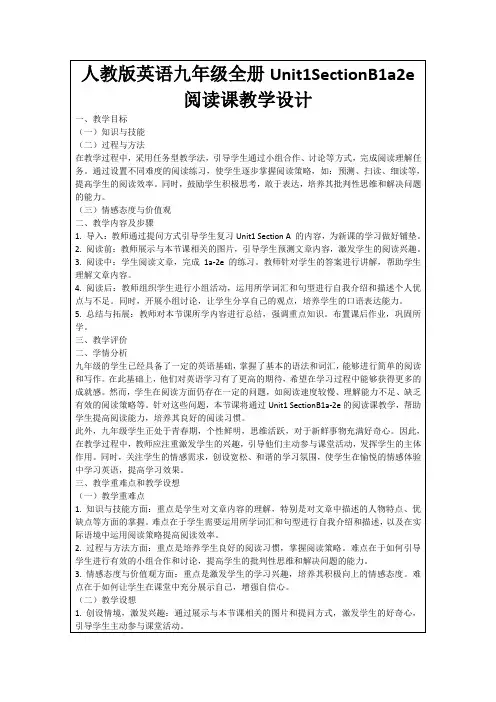
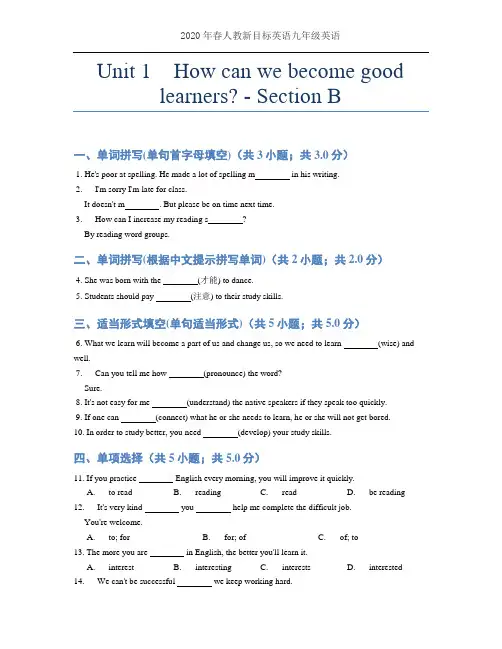
Unit 1 How can we become goodlearners? - Section B一、单词拼写(单句首字母填空)(共3小题;共3.0分)1. He's poor at spelling. He made a lot of spelling m in his writing.2. --- I'm sorry I'm late for class.--- It doesn't m . But please be on time next time.3. --- How can I increase my reading s ?--- By reading word groups.二、单词拼写(根据中文提示拼写单词)(共2小题;共2.0分)4. She was born with the (才能) to dance.5. Students should pay (注意) to their study skills.三、适当形式填空(单句适当形式)(共5小题;共5.0分)6. What we learn will become a part of us and change us, so we need to learn (wise) and well.7. --- Can you tell me how (pronounce) the word?--- Sure.8. It's not easy for me (understand) the native speakers if they speak too quickly.9. If one can (connect) what he or she needs to learn, he or she will not get bored.10. In order to study better, you need (develop) your study skills.四、单项选择(共5小题;共5.0分)11. If you practice English every morning, you will improve it quickly.A. to readB. readingC. readD. be reading12. --- It's very kind you help me complete the difficult job.--- You're welcome.A. to; forB. for; ofC. of; to13. The more you are in English, the better you'll learn it.A. interestB. interestingC. interestsD. interested14. --- We can't be successful we keep working hard.--- I agree with you.A. ifB. unlessC. becauseD. when15. I really don't know this question.A. which to doB. which to answerC. what to doD. how to answer五、翻译(根据中文提示完成句子)(共5小题;共5.0分)16. 在某种程度上,是否能学好英语取决于你的英语学习习惯。
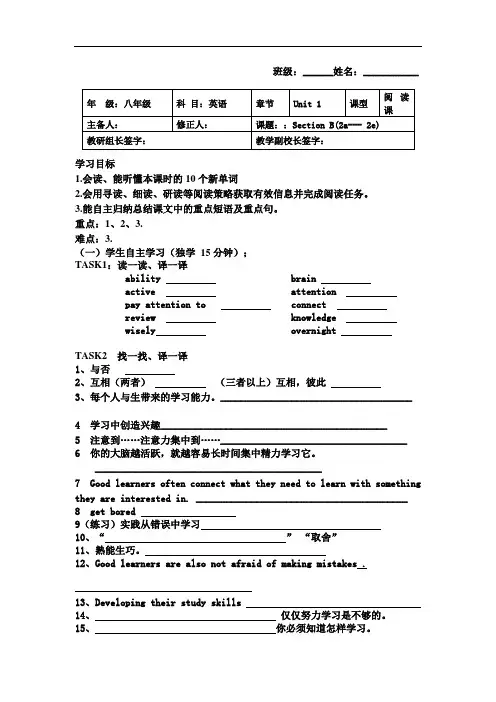
班级:______姓名:___________学习目标1.会读、能听懂本课时的10个新单词2.会用寻读、细读、研读等阅读策略获取有效信息并完成阅读任务。
3.能自主归纳总结课文中的重点短语及重点句。
重点:1、2、3.难点:3.(一)学生自主学习(独学15分钟);TASK1:读一读、译一译ability brainactive attentionpay attention to connectreview knowledge wisely overnightTASK2 找一找、译一译1、与否2、互相(两者)(三者以上)互相,彼此3、每个人与生带来的学习能力。
______________________________________4 学习中创造兴趣_____________________________________________5 注意到……注意力集中到……_____________________________________6 你的大脑越活跃,就越容易长时间集中精力学习它。
_____________________________________________7 Good learners often connect what they need to learn with something they are interested in. __________________________________________8 get bored9(练习)实践从错误中学习10、“”“取舍”11、熟能生巧。
12、Good learners are also not afraid of making mistakes .13、Developing their study skills14、仅仅努力学习是不够的。
15、你必须知道怎样学习。
16、优秀学生找到最佳学习方法去学好。
17、They may take notes by writing down key words or by drawing mind maps.18、by reading their notes19、by explaining the information to another student20.学问相长。
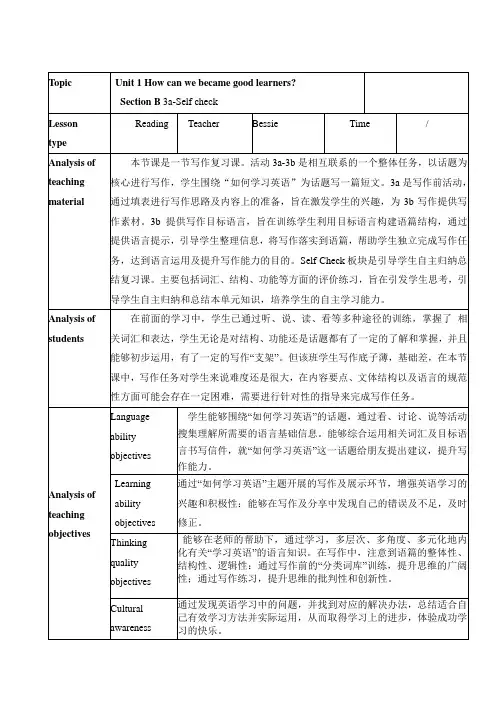
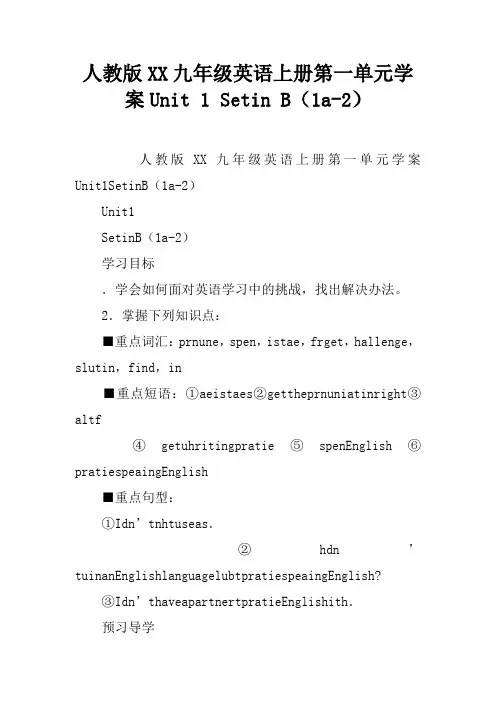
人教版XX九年级英语上册第一单元学案Unit 1 Setin B(1a-2)人教版XX九年级英语上册第一单元学案Unit1SetinB(1a-2)Unit1SetinB(1a-2)学习目标.学会如何面对英语学习中的挑战,找出解决办法。
2.掌握下列知识点:■重点词汇:prnune,spen,istae,frget,hallenge,slutin,find,in■重点短语:①aeistaes②gettheprnuniatinright③altf④getuhritingpratie⑤spenEnglish⑥pratiespeaingEnglish■重点句型:①Idn’tnhtuseas.②hdn’tuinanEnglishlanguagelubtpratiespeaingEnglish?③Idn’thaveapartnertpratieEnglishith.预习导学预习SetinB2a,2b,根据自己实际情况,写出在英语学习中遇到的挑战及解决办法。
hallenges:S1utins:合作研讨一、重点单词与短语.Frgetv.忘记例如:Iftenfrgetaltfnerds.我经常忘记许多生词。
【辨析】frget+n/frgettd/frgetdingsth.frget+n/prn忘记……;frgettdsth。
忘记要做某事;frgetdingsth.忘记做过某事。
【跟踪训练】(1)LasteeIetldfriendLiingbutIfrgt hifrhistelephnenuberAasBasingandasDtas【拓展】frgetsth.与1eftsth.sheftsth.sh.把某物忘在某处【跟踪训练】(2)昨天我把雨伞忘在了教室里。
esterdaIubrellainthelassr.2.Findv.发现;找到,强调找到的结果例如:Haveufundurb?你找到书了吗?【辨析】find/1fr/findutfr寻找,强调动作的过程。
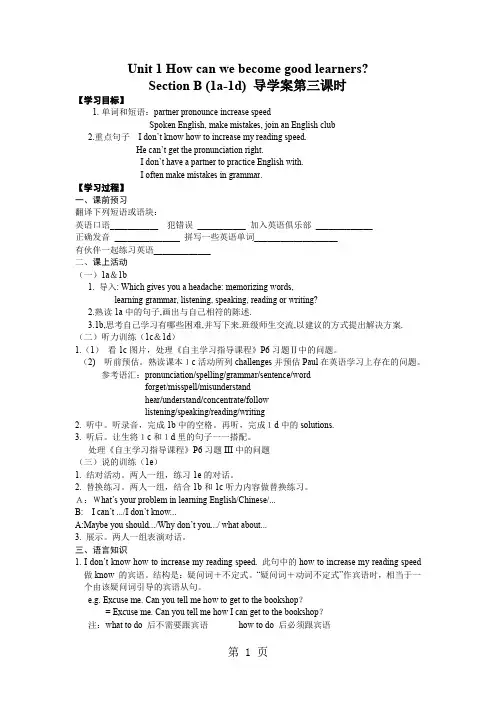
Unit 1 How can we become good learners?Section B (1a-1d) 导学案第三课时【学习目标】1.单词和短语:partner pronounce increase speedSpoken English, make mistakes, join an English club2.重点句子I don’t know how to increase my reading speed.He can’t get the pronunciation right.I don’t have a partner to practice English with.I often make mistakes in grammar.【学习过程】一、课前预习翻译下列短语或语块:英语口语___________ 犯错误___________ 加入英语俱乐部_____________正确发音_______________ 拼写一些英语单词___________________有伙伴一起练习英语_____________二、课上活动(一)1a&1b1. 导入: Which gives you a headache: memorizing words,learning grammar, listening, speaking, reading or writing?2.熟读1a中的句子,画出与自己相符的陈述.3.1b,思考自己学习有哪些困难,并写下来.班级师生交流,以建议的方式提出解决方案. (二)听力训练(1c&1d)1.(1)看1c图片,处理《自主学习指导课程》P6习题Ⅱ中的问题。
(2) 听前预估。
熟读课本1c活动所列challenges并预估Paul在英语学习上存在的问题。
参考语汇:pronunciation/s pelling/grammar/sentence/wordforget/misspell/misunderstandhear/understand/concentrate/followlistening/speaking/reading/writing2. 听中。
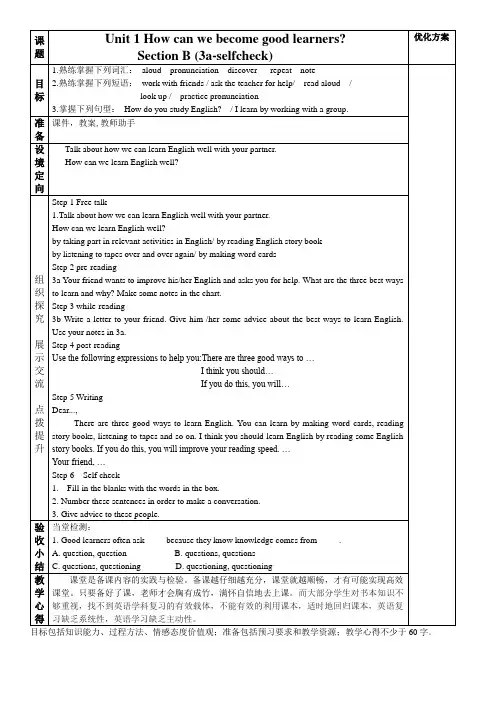
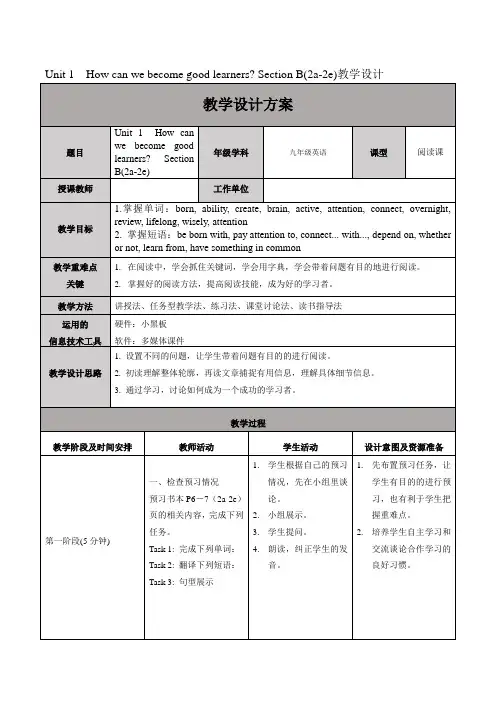
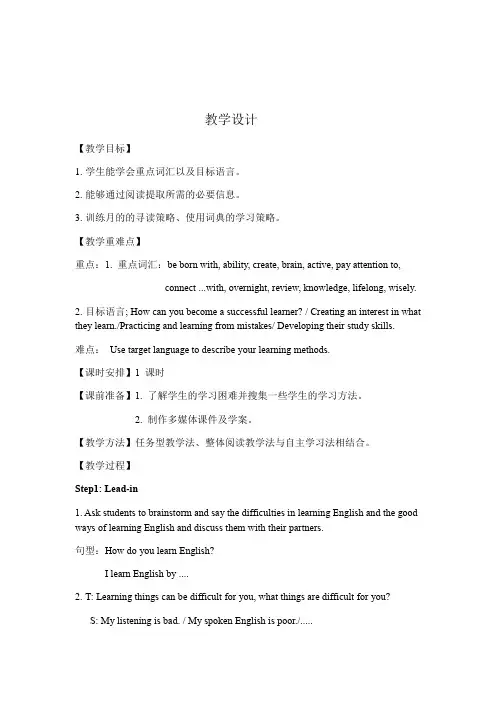
教学设计【教学目标】1.学生能学会重点词汇以及目标语言。
2.能够通过阅读提取所需的必要信息。
3.训练月的的寻读策略、使用词典的学习策略。
【教学重难点】重点:1. 重点词汇:be born with, ability, create, brain, active, pay attention to,connect ...with, overnight, review, knowledge, lifelong, wisely.2.目标语言; How can you become a successful learner? / Creating an interest in what they learn./Practicing and learning from mistakes/ Developing their study skills.难点:Use target language to describe your learning methods.【课时安排】1 课时【课前准备】1. 了解学生的学习困难并搜集一些学生的学习方法。
2. 制作多媒体课件及学案。
【教学方法】任务型教学法、整体阅读教学法与自主学习法相结合。
【教学过程】Step1: Lead-in1. Ask students to brainstorm and say the difficulties in learning English and the good ways of learning English and discuss them with their partners.句型:How do you learn English?I learn English by ....2.T: Learning things can be difficult for you, what things are difficult for you?S: My listening is bad. / My spoken English is poor./.....3.T: ask some of the students to give the solutions to solve the problems?S: You can improve you listening by.....Step2: Pre-reading1.Look at the picture. (predict the picture)Q: Where are they?What are they doing?Who do you think can learn better? Why?Then ask some students to share their answers.T: So, we should have good listening habits in class.2.Discussion:Q: What good learning habits can you think of ?①Doing homework every day and reviewing the lessons after school.②looking up a dictionary when meeting new words③....Step3:While-reading1.Read the words together.2.Read the title, subtitles, introduction and the ending on page 6. Then answer the questions below.①What does the passage talk about?②What’s the secret to be a successful learner?③What are successful learners’habits?④Is learning a lifelong journey?3.Read the subtitles, answer the following questions.(1)Creating an interest in what they learnQ:1.Can you find an example of this habit?Q: 2. Why is this habit useful?(2) Practicing and learning from mistakesQ: 1.Can you find two famous sayings? What do they mean?Q: 2. Do good learners learn from mistakes, or are they afraid of making mistakes?(3) Developing their study skillsQ: 1.What study skills are mentioned?Q: 2. Do you have those study skills?(4) Asking questionsQ:How can learners ask questions?4. Read the last para.Q: Is learning a lifelong journey? Why?Q: What’s the writer’s advice?Step4: post-reading1.Sum up the for good learning habits.2. What other learning habits do you think are useful?3. What learning habits can help you to improve you study? Why?Students discuss with their group members then ask one of the students to share. Step5: Sum up.Step6: Homework.1, Recite the text.1. Exercise.。
Unit1 Section B学案一. 学习目标:1.明确学习中存在的问题,会翻译1a中的句子,掌握spoken, make mistakes in grammar用法。
2. 掌握学习英语的科学方法,翻译并熟读3a, 掌握first of all/to begin with/ lateron/ laugh at/be afraid to/take notes等词组。
3. 熟练运用所学词语,完成self-check.二.学习过程:Step1. Translate and remember the following words and phrases1.pronounce(v)_____________pronunciation(n) ___________2. spoken English__________3.make mistakes in grammar _______4. slowly ____________5. comma________________6. challenge ______________7. solution _______________8. later on_______________9. realize _______________10. I t doesn’t matter _________ 11. be afraid to_____________12. laugh at ____________ 13. complete_______________ 14. secret_________________15. learner _________16. take notes _____________ 17. term _________________ 18. impress ____________19. trouble _______________20.fast___________________21.look up _______________22. soft __________________ 23. make up______________24. essay ________________Step 2. Check. Finish 1a Translate each sentence. Finish 1b.Step 3. Listen and check. Finish 2a and 2b.Step4. Practice. Translate the following sentences.1.你应该找个笔友。
人教版XX九年级英语上册第一单元学案Unit 1 Setin B(3a—4)
人教版XX九年级英语上册第一单元学案Unit1SetinB(3a—4) Unit1 SetinB(3a—4) 学习目标 向同学们学习他们学习英语的成功经验。 2掌握下列知识点: ■重点词汇:realize,atter,plete,tr,seret,truble,ipress,fast ■重点短语:①latern ②itdesn'tatter ③beafraidt ④ending ⑤laughat ⑥taentes ⑦firstfall ■重点句型: ①Firstfall,itasn’teasfretunderstandtheteaherhenshetaled ②Latern,Irealizedthatitdesn'tatterifudn'tunderstandeverrd ③Ithinthatdingltsf1isteningpratieisneftheseretsfbeingagdlanguagelearner 预习导学 Ⅰ预习单词部分:根据句意及汉语提示完成下列句子。 AtlastI (意识到)theiprtaneflearningEnglishell 2Iasals (害怕)tspeainlass 3Ian'tae (完整的)sentenes Ⅱ预习SetinB,3a部分的内容,判断下列句子正误。 [rite’’(frtrue)r“F”(frfalse)] 4Theteaher’sprnuniatinaspr ( ) Peplealaslaughedatherhenshespe ( ) 6Shehadtrubleaingpletesentenes ( ) 合作研讨 一、重点单词与短语 trv尽力;尝试,其后接动词不定式,trtdsth尽力做某事;设法做某事。Trnttdsth尽力不做某事。 例如:Itrtfinishherntie我尽力按时完成家庭作业。 【拓展】trdingsth尝试着做某事;Trne’sbesttdsth尽某人最大努力做某事 Trn试穿(衣服;鞋;帽等),此处n为副词 Haveatr试一下,tr意为“尝试”,此处为名词 【跟踪训练】 (1)eshuldtrurbest theprble Aslve Bs1utin tslve Dslving 2endingsth喜欢做某事;乐意做某事,在“en,ind,finish"等动词后,常接名词、代词或动名词作宾语 【拓展】enneself玩得开心,相当于haveagdtie 【跟踪训练】 (2)他喜欢踢足球。 He ftball 二、重点句型 Firstfa11,itasn'teasfretunderstandtheteaherhenshetaled 首先,老师讲的时候,我很难听懂老师的话 【精解】firstfall意为“首先”。 henn意为“当……时”,引导时间状语从句。 【跟踪训练】 (3)当他回来时,我给你打电话。 I’llallu heesba 2Latern,Irealizedthatitdesn'tatterifudn'tunderstandeverrd 后来,我意识到如果你不理解每个单词也没有关系 【精解】①latern意为“以后;随后”,作副词短语使用。 ②realizev意为“认识到;了解到”,后接名词或从句作宾语。 ③atterv意为“重要;要紧;有关系”,后常跟疑问词引导的从句。 【辨析】latern/later ater作副词用,意为“后来;以后”,以现在或以前的时间为基准,常用于一般将来时或一般过去时。later可以和一段时间连用,构成“时间段+later"结构,常用于一般过去时;但是latern只可单独使用,不能用于“时间段+latern"结构。 【跟踪训练】 (4)一星期后他闯来了。 Heaeba
九年级英语第一单元Unit 1 Section B学案(人教版) 九年级英语第一单元Unit 1 Setin B学案(人教版) Unit 1 Setin B(1a-2) 学习目标 1.学会如何面对英语学习中的挑战,找出解决办法。 2.掌握下列知识点: ■重点词汇:prnune,spen,istae,frget,hallenge,slutin,find,in ■重点短语:①ae istaes ②get the prnuniatin right③a lt f ④get uh riting pratie ⑤spen English ⑥pratie speahng English ■重点句型: ①I dn’t n h t use as. ②h dn’t u in an English language lub t pratie speaing English? ③I dn’t have a partner t pratie English ith. 预习导学 预习Setin B 2a,2b,根据自己实际情况,写出在英语学习中遇到的挑战及解决办法。 hallenges: S1utins: 合作研讨 一、重点单词与短语 1.Frget v.忘记 例如:I ften frget a lt f ne rds.我经常忘记许多生词。 【辨析】frget+n/frget t d/frget ding sth. frget+n/prn忘记……;frget t d sth。忘记要做某事; frget ding sth.忘记做过某事。 【跟踪训练】 (1)Last ee I et ld friend Li ing but I frgt hi fr his telephne nuber Aas Basing and as Dt as 【拓展】frget sth.与1eft sth.sh 1eft sth.sh.把某物忘在某处 【跟踪训练】 (2)昨天我把雨伞忘在了教室里。 esterda I ubrella in the lassr. 2.Find v.发现;找到,强调找到的结果 例如:Have u fund ur b?你找到书了吗? 【辨析】find/1 fr/find ut 1 fr寻找,强调动作的过程。 find ut查出;查明;弄清楚,指通过观察、思考、探索而找到或发现。 【跟踪训练】 (3)—hat’S the atter? —I’ having truble h has taen b Afinding Bling fr finding ut Dling up 3.in v.参加;加入,指加入某党派、团体或组织,并成为其中的一员 例如: brther ined the ar last ear.我哥哥去年参的军。 【辨析】in/tae part in Tae part in指参加活动、比赛、会议或运动等。 【跟踪训练】 (4)你参加这次运动会了吗? Did u the sprts eeting? 4ae istaes犯错;出错,是动词短语,istae是可数名词,还可以为ae a istae。 istaefr错把……当作……,istae为及物动词,后接名词或代词作宾语。 【拓展】还可以构成其他短语: (1)ae a living谋生 (2)ae faes做鬼脸 (3)ae up编造 (4)ae friends交朋友 ()ae ne赚钱 (6)ae a deisin做决定 【跟踪训练】 ()—u l sad,ate. —eah,I have ade istaes in reprt。 Aa little Blittle a fe Dfe 二、重点句子 1.I dn’t n h t use as. 我不知道如何使用逗号。 【精解】句子中的h t use as为“疑问词+动词不定式”结构,作动词n的宾语。动词不定式前面加上疑问词hat,hih,hen,here,h等,用于n,tell,nder,as,find ut,1earn等动词或动词短语之后作宾语。 【跟踪训练】 (6)我不知道什么时候离开。 I dn’t n 2.I dn’t have a partnert pratie English ith. 我没有一个一起练习英语的伙伴。 【精解】句子中的动词不定式短语t pratie English ith作定语,修饰名词partner。 【跟踪训练】 (7)He is nt an eas an Aget n B.t seten .get n ith Dt get n ith 当堂检测 Ⅰ根据句意及首字母提示完成单词 1.His s English is ver gd beause his ther is an Aerian 2.an u give e a gd s t the prble? 3.P1ease be areful.Dn’t ae the sae Ⅱ.用所给单词的适当形式填空 4.ill u please spea (sl)? .He ined an English lub t pratie (spea)English. 6.I an’t (prnuniatin)se f the rds. Ⅲ.根据汉语提示完成句子 7.我经常在语法方面出错误。 I ften in graar. 8.保罗发音不正确。 Paul an’t the prnuniadn 9.英语口语比书面英语更难一些。 is re diffiult than 后练习 Ⅰ.单项选择 ( )1.—I dn’t n h t read the rd“ediu”. — as r Li fr help? Ahat abut BLet’s .H abut D.h dn’t u ( )2.h nt a usi lub t pratie singing pp sngs? Ataepartin B.in .g Dining ( )3. She’ll be here sn. APerhaps B.Ppssle Sure, Da be ( )4 P1ease give e a piee f paper At rite Briting t rite n Driting ith ( )Reading helps hi that a Alt Ba lt an Dver ( )6His father aes a 1iving driving a taxi Ab Bfr ith Dthrugh ( )7—uld u please tell e next? —Thin it veru’ll find a gd a Ahen t d Bh t d hat t d Dhere t g Ⅱ 阅读理解 Peple 1iving in d订ferent untries have different inds f rdsTda there are abut fifteen hundred 1anguages in the rldEah ntains an thusands f rdsA ver 1arge didnar,fr exaple,English ntains fur r five hundred thusand rdsBut e d nt need a11 theseT read shrt stries,u need t n nl abut t thusand rdsBefre u 1eave shl,u ill 1earn nl ne thusand r reThe rds u n are alled ur vabularu Shuld tr t ae ur vabular largerRead as an bs as u anThere are a 1t f bs ritten in eas English fr u t readu ill en thehen u eet a ne rd,find t in the ditinarurditinar is ur st useful b ( )8The nuber f different 1anguages spen is abut A10 B1,000 00 D1,00 ( )9Befre u leave ur shl,u’11 1earn Anl t thusand rds Bfive hundred thusand rds re than ne thusand rds Dthree r fur thusand rds ( )10T ae ur vabular bigger,u ust Aget as an ditinaries as u an Bread as an bs as u an bu a 1t f bs Dhave a ver 1arge English ditinarUnit 1 Setin B (3a—4) 学习目标 1向同学们学习他们学习英语的成功经验。 2掌握下列知识点: ■重点词汇:realize,atter,plete,tr,seret,truble,ipress,fast ■重点短语:①later n ②it desn’t atter ③be afraid t ④en ding ⑤laugh at ⑥tae ntes ⑦first f all ■重点句型: ①First f all,it asn’t eas fr e t understand the teaher hen she taled ②Later n,I realized that it desn’t atter if u dn’t understand ever rd ③I thin that ding lts f 1istening pratie is ne f the serets f being a gd language learner 预习导学 Ⅰ预习单词部分:根据句意及汉语提示完成下列句子。 1At last I (意识到)the iprtane f learning English ell 2I as als (害怕)t spea in lass 3I an’t ae (完整的)sentenes Ⅱ预习Setin B,3a部分的内容,判断下列句子正误。 [rite“T’’(fr true)r“F”(fr false)] 4The teaher’s prnuniatin as pr ( )